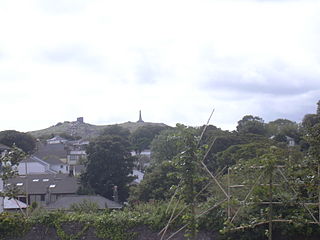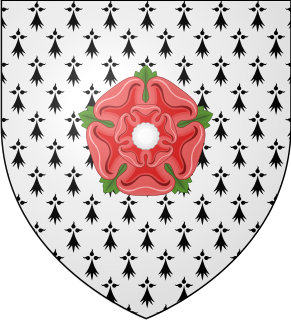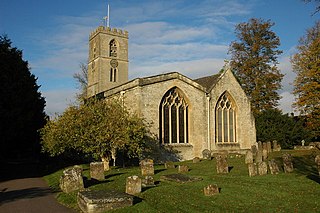
Carn Brea is a civil parish and hilltop site in Cornwall, England, United Kingdom. The population of Carn Brea including Bosleake and Church Coombe was 8,013 at the 2011 census. The hilltop site is situated approximately one mile (1.6 km) southwest of Redruth. The settlements of Bosleake, Brea, Broad Lane, Carn Arthen, Carn Brea Village, Carnkie, Four Lanes, Grillis, Illogan Highway, Pencoys, Penhallick, Piece, Pool, Tolskithy, Tregajorran, Treskillard, Tuckingmill and West Tolgus are in the parish.
Mitchell, or St Michael was a rotten borough consisting of the town of Mitchell, Cornwall. From the first Parliament of Edward VI, in 1547, it elected two members to the Unreformed House of Commons.
Sir William Lemon, 1st Baronet was a Member of Parliament for Cornish constituencies from 1770 to 1824, a total of 54 years.
John Basset was a writer on Cornish mining. He was deeply interested in Cornish mining, mining technology and economics.

Baron Basset, of Stratton in the County of Cornwall, was a title in the Peerage of Great Britain. It was created in 1797 for Francis Basset, 1st Baron de Dunstanville, with remainder, failing heirs male of his own, to his daughter the Honourable Frances Basset. He had already been created a baronet, of Tehidy in the County of Cornwall, in the Baronetage of Great Britain in 1779, and Baron de Dunstanville, of Tehidy in the County of Cornwall, in the Peerage of Ireland in 1796. Both these titles were created with normal remainder to heirs male. Lord de Dunstanville and Basset was the eldest son of Francis Basset. The baronetcy and barony of de Dunstanville became extinct on his death in 1835 while he was succeeded in the barony of Basset according to the special remainder by his daughter, Frances, the second Baroness Basset. She never married and the barony became extinct on her death in 1855.
Frances Basset, 2nd Baroness Basset was a British peeress.

Hugh Boscawen, 1st Viscount Falmouth was a Cornish Whig politician who sat in the House of Commons for Cornish constituencies from 1702 until 1720 when he was raised to the peerage.

Sir John Basset, KB, of Tehidy in Cornwall and of Umberleigh in Devon was Sheriff of Cornwall in 1497, 1517 and 1522 and Sheriff of Devon in 1524. Although himself an important figure in the Westcountry gentry, he is chiefly remembered for his connection with the life of his second wife and widow Honor Grenville, who moved into the highest society when she remarried to Arthur Plantagenet, 1st Viscount Lisle KG, an illegitimate son of King Edward IV, and an important figure at the court of King Henry VIII, his nephew. The survival of the Lisle Letters, a large collection of letters to Lisle and his wife Honor, makes their lives two of the best-documented of the period. Honor retained for life as her widow's dower several Basset estates including Umberleigh and Tehidy, and the Lisle Letters include a great deal of correspondence to Honor from her stewards concerning their detailed management. They also include much correspondence to her from her children by Sir John Basset.
Great Cornish Families: A History of the People and Their Houses is a book by Crispin Gill, published in 1995. A second edition was published in 2011 (ISBN 978-0-85704-083-1). Crispin Gill, at the time of the book's publication, lived in Plymouth and was assistant editor of the Western Morning News. This article names many notable families that have featured prominently in Cornwall's history.

Sir Francis Bassett of Tehidy in the parish of Illogan in Cornwall, was Sheriff of Cornwall and a Vice-Admiral of Cornwall, a Member of Parliament for St. Ives and Recorder of St Ives. His portrait by Vandyck was formerly displayed at Tehidy. He appears to have been a sportsman, much addicted to hawking and cock-fighting.

Members of the Basset family were amongst the early Norman settlers in the Kingdom of England. It is currently one of the few ancient English families that has survived through the centuries in the paternal line. They originated at Montreuil-au-Houlme in the Duchy of Normandy.

Sir Arthur Bassett (1541–1586) was a member of the prominent west-country Basset family and was MP for Barnstaple in 1563 and Devon in 1572. He served as JP for Devon from 1569 to his death and as Sheriff of Devon in 1574–5. He was knighted in 1575. He had been appointed deputy warden of Stannaries by 1580.

Sir Robert Basset (1573-1641), lord of the manor of Umberleigh and lord of the manor of Heanton Punchardon in Devon, England, was MP for Plymouth in 1593.

Basset Mines was a mining company formed in Cornwall, England, by the amalgamation of six copper and tin mining setts. It operated from 1896 until 1918, when it was closed due to a fall in the price of tin.
The Manor of Heanton Punchardon was a manor in the parish of Heanton Punchardon, Devon, England.























